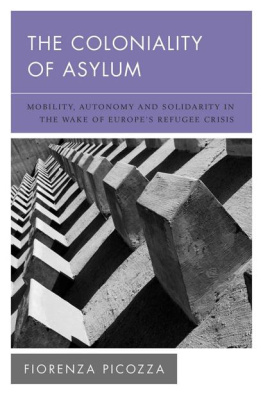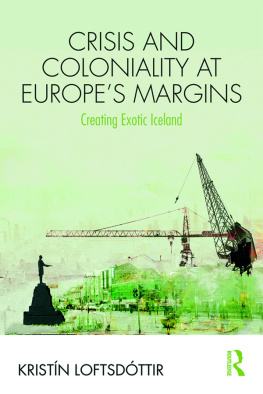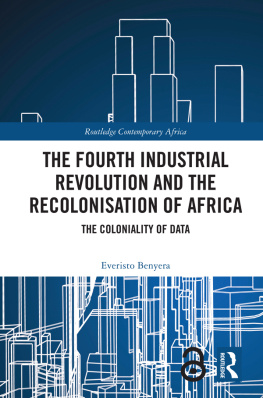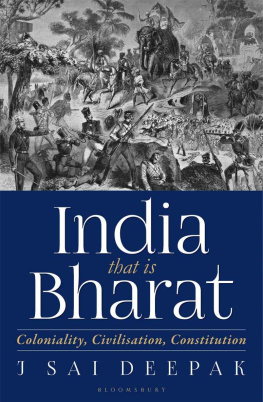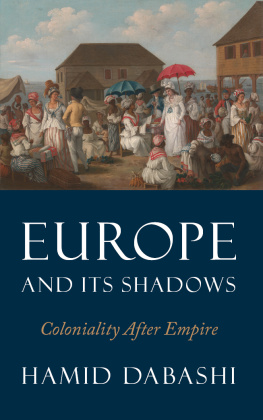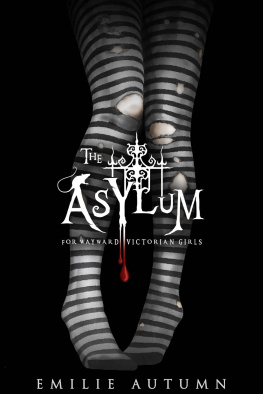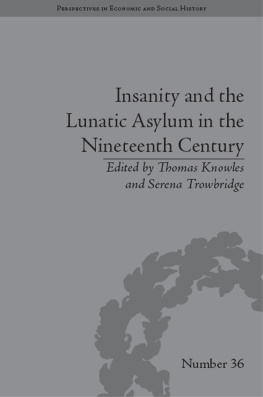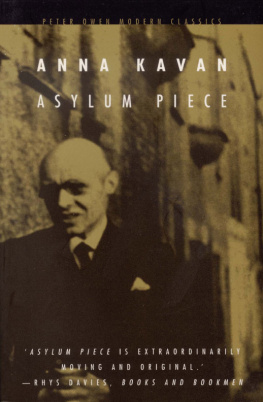Fiorenza Picozza - The Coloniality of Asylum
Here you can read online Fiorenza Picozza - The Coloniality of Asylum full text of the book (entire story) in english for free. Download pdf and epub, get meaning, cover and reviews about this ebook. year: 2021, publisher: Rowman & Littlefield Publishers, genre: Politics. Description of the work, (preface) as well as reviews are available. Best literature library LitArk.com created for fans of good reading and offers a wide selection of genres:
Romance novel
Science fiction
Adventure
Detective
Science
History
Home and family
Prose
Art
Politics
Computer
Non-fiction
Religion
Business
Children
Humor
Choose a favorite category and find really read worthwhile books. Enjoy immersion in the world of imagination, feel the emotions of the characters or learn something new for yourself, make an fascinating discovery.
- Book:The Coloniality of Asylum
- Author:
- Publisher:Rowman & Littlefield Publishers
- Genre:
- Year:2021
- Rating:4 / 5
- Favourites:Add to favourites
- Your mark:
- 80
- 1
- 2
- 3
- 4
- 5
The Coloniality of Asylum: summary, description and annotation
We offer to read an annotation, description, summary or preface (depends on what the author of the book "The Coloniality of Asylum" wrote himself). If you haven't found the necessary information about the book — write in the comments, we will try to find it.
The Coloniality of Asylum — read online for free the complete book (whole text) full work
Below is the text of the book, divided by pages. System saving the place of the last page read, allows you to conveniently read the book "The Coloniality of Asylum" online for free, without having to search again every time where you left off. Put a bookmark, and you can go to the page where you finished reading at any time.
Font size:
Interval:
Bookmark:
The Coloniality of
Asylum
New Politics of Autonomy
Series Editors : Saul Newman and Martina Tazzioli
In recent years, we have witnessed an unprecedented emergence of new forms of radical politicsfrom Tahrir Square, Gezi Park and the global Occupy movement, to Wikileaks and hacktivism. What is striking about such movements is their rejection of leadership structures and the absence of political demands and agendas. Instead, their originality lies in the autonomous forms of political life they engender.
The New Politics of Autonomy book series is an attempt to make sense of this new terrain of anti-political politics, and to develop an alternative conceptual and theoretical arsenal for thinking the politics of autonomy. The series investigates political, economic and ethical questions raised by this new paradigm of autonomy. It brings together authors and researchers who are engaged, in various ways, with understanding contemporary radical political movements and who approach the theme of autonomy from different perspectives: political theory, philosophy, ethics, literature and art, psychoanalytic theory, political economy, and political history.
Titles in the Series
Spaces of Governmentality: Autonomous Migration and the Arab Uprisings
Martina Tazzioli
The Composition of Movements to Come: Aesthetics and Cultural Labour After the Avant-Garde
Stevphen Shukaitis
Foucault and the Making of Subjects
Edited by Laura Cremonesi, Orazio Irrera, Daniele Lorenzini and Martina Tazzioli
Italian Critical Thought: Genealogies and Categories
Edited by Dario Gentili, Elettra Stimilli and Glenda Garelli
In the Marxian Workshops: Producing Subjects
Sandro Mezzadra
Anarchisms, Postanarchisms and Ethics
Benjamin Franks
The Urban Enigma: Time, Autonomy, and Postcolonial Transformations in Latin America
Simone Vegli
The Arab Spring Between Transformation and Capture: Autonomy, Media and Mobility in Tunisia
Oana Prvan
The Coloniality of Asylum: Mobility, Autonomy and Solidarity in the Wake of Europes Refugee Crisis
Fiorenza Picozza
The Coloniality of
Asylum
Mobility, Autonomy and
Solidarity in the Wake of Europes
Refugee Crisis
Fiorenza Picozza
ROWMAN & LITTLEFIELD
Lanham Boulder New York London
Published by Rowman & Littlefield
An imprint of The Rowman & Littlefield Publishing Group, Inc.
4501 Forbes Boulevard, Suite 200, Lanham, Maryland 20706
www.rowman.com
Copyright 2021 by Fiorenza Picozza
All rights reserved . No part of this book may be reproduced in any form or by any electronic or mechanical means, including information storage and retrieval systems, without written permission from the publisher, except by a reviewer who may quote passages in a review.
British Library Cataloguing in Publication Information Available
Library of Congress Cataloging-in-Publication Data
Library of Congress Control Number: 2020950801
ISBN: 978-1-5381-5009-2 (cloth : alk. paper)
ISBN: 978-1-5381-5010-8 (electronic)
 The paper used in this publication meets the minimum requirements of American National Standard for Information SciencesPermanence of Paper for Printed Library Materials, ANSI/NISO Z39.48-1992.
The paper used in this publication meets the minimum requirements of American National Standard for Information SciencesPermanence of Paper for Printed Library Materials, ANSI/NISO Z39.48-1992.
Contents
This book is a testament to a decade of involvement in migrant struggles, in praxis, and thought. It was written in different geographic locations and is woven of uncountable conversations and heated arguments, as well as affection, bitterness, rage, hope and even joy what Audre Lorde would describe as the erotic. Its second draft was elaborated during the COVID-19 pandemic in Mexico City, an ocean away from my native Italy, and from London and Hamburg the northernmost ends of the geography of my heart. The predominance of online communication during the pandemic made space for retaking some old connections on the other side of the pond while strengthening new ones, conspiring with a new elective Mexican family. In my darkest moments of that period, I was held by the virtual presence of Palestinian, Afghan, Syrian, Cuban, Mexican, Ethiopian and Iranian friends, who helped me cope with the ruptures, separations, uncertainties and fragilities of my own migration having they, or their beloved ones, been migrants too. They all deeply suffered from the consequences of global coloniality and the unfairness of border regimes, yet they never derided my more privileged preoccupations. It is to them that this book is dedicated, for these mutual solidarity, complicity and tenderness are the most precious learnings and gifts that I have received from the last decade.
Intellectually, politically and affectively I owe an awful lot to the teachers, guides, comrades and students who have accompanied me in the course of my MA at the School of Oriental and African Studies and PhD at Kings College London. Nicholas De Genova was the incredibly thorough and supporting supervisor of the dissertation that provided the foundations for this book. Danae Avgeri and Francesco Bosso were its most attentive readers, as well as dearest partners in crime and levity. Martina Tazzioli is the unwavering bastion that orients many of us, and I owe her the very publication of this book. My PhD examiners, Shahram Khosravi and Bridget Anderson, allowed me to conclude that chapter of my life in the best possible way, encouraging me to continue writing far beyond what I could have expected. Alongside them, I am deeply grateful to Phil Hubbard, Paru Raman, Sami Everett, Hannah Schling, Simone Vegli, Adam Elliott Cooper, Elena Fontanari, Bernd Kasparek, Mical Nelken, Gavriel Nelken, Simona Pagano, Maurizio Totaro, Yari Lanci, Samir Harb, Anna Grimaldi, Juan Grigera, Sam McLean and Sam Hayward all of whom have accompanied me in unique ways through the journey of researching, writing and teaching.
Furthermore, the political and narrative imagination that animates this book was deeply nourished by Habib Zadran, Mahmoud Qudaih, Dagmawi Yimer, Rajaa Shamam, Aischa Abdirihman Dirir, Tanja van de Loo, Amarela Varela, ngel Martnez Filosoflow, Annika Schnitzler, Ernesto Morales Bautista, Gabriel Brito Nunes, Chiara Mammarella, Diego Ferraris, Piero Consentino, Fabin Villegas, Ali Alizadeh and Marco Carsetti.
George Sidaoui drew the wonderful maps that visualise the places and trajectories I narrate and was one of the dearest companions at the time I wrote my thesis. Andrea Contenta read the last draft of this manuscript and thus had to fulfil the troublesome task of cheering me up against my continuous loss of meaning.
My father needs a special mention for convincing me to complete this book when I was only a step away from giving up. To my mum, I owe the scorching fury that animates the text; to my sister, the tenderness to soothe it, as well as the burdens she took to pave a smoother way for my coming into this world. To Carolina Purificati, I am bound through a deep-rooted friendship which keeps renewing itself as the waves roll onto the shore and back. And I thank Alan Moreno for his infinite patience in accompanying me through my shadows and for the bright days in Puebla looking for cave paintings.
To all the people in Hamburg, who in a way or another supported me in the course of fieldwork, I owe more than they could realise and more than I could convey here; this book would not exist without their generosity and companionship. For my London crew, I have infinite gratefulness and love; the years I spent there were among the most beautiful and dreadful experiences of my life and they all helped to enlarge my way of thinking and feeling. To my home or idea thereof in Italy, I have returned once more, to absorb and permeate the love of my summer companions while submitting the manuscript. Despite feeling I can never return permanently, it is one of the places that allow me to dream, bloom and feel through my skin the most even during these dark times.
Next pageFont size:
Interval:
Bookmark:
Similar books «The Coloniality of Asylum»
Look at similar books to The Coloniality of Asylum. We have selected literature similar in name and meaning in the hope of providing readers with more options to find new, interesting, not yet read works.
Discussion, reviews of the book The Coloniality of Asylum and just readers' own opinions. Leave your comments, write what you think about the work, its meaning or the main characters. Specify what exactly you liked and what you didn't like, and why you think so.

